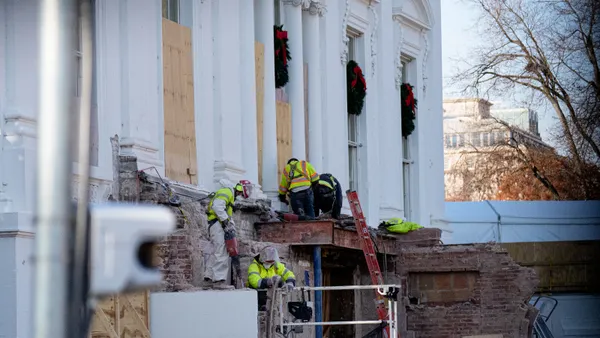Dive Brief:
- New York construction industry and business groups calling themselves the Scaffold Law Reform Coalition have penned a letter to New York Gov. Andrew Cuomo asking him to use the state budget process to scrap Labor Law 240, also known as the Scaffold Law. The regulation translates to full liability for owners and contractors if an employee falls and is injured and was not provided with the prescribed protective equipment.
- The 75-member group said that New York is the only state that has such a restrictive law and that it is costing millions of dollars in state and municipal budgets, hundreds of millions in infrastructure costs and approximately $200 million a year in education budgets across the state.
- The group wrote that there are extra costs and reduced revenue associated with the COVID-19 pandemic, that the resulting financial outlook is "bleak" and that getting rid of the Scaffold Law and its "outdated absolute liability standard [in favor of] a more equitable and modern comparative negligence standard" would be a simple fix.
Dive Insight:
The Associated Builders and Contractors (ABC) Empire State chapter maintains that because of the Scaffold Law, general liability costs are higher in New York than in any other state and that some insurance carriers won't even write policies for New York contractors.
According to a 2017 Common Good report, the Scaffold Law increases insurance costs on New York public projects by $785 million, leaving state taxpayers to foot the bill. For instance, a project like the proposed $11 billion Hudson River tunnel replacement could cost taxpayers up to $300 million in additional insurance costs.
"This is a law that needs to be repealed," said Brian Sampson, president of ABC Empire State. "It’s created a general liability cost nightmare for contractors."
Previous attempts to repeal the law have been unsuccessful.
According to the New York Committee for Occupational Safety and Health (NYCOSH), the Scaffold Law protects the workers who perform some of the most dangerous work in construction. The group also argues that contractors only have liability if they do not provide safety equipment or put their workers at risk through violations of safety and health regulations.
Critics of the Scaffold Law maintain that even an employee's gross violations of safety standards does not exempt employers and owners from responsibility.
As to the higher insurance premiums as a result of the law, NYCOSH suggests that insurance companies that write the pricey general liability policies open their books so that the public can determine if the law is really the culprit.













